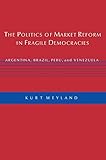The Politics of Market Reform in Fragile Democracies : Argentina, Brazil, Peru, and Venezuela / Kurt Weyland.
Material type: TextPublisher: Princeton, NJ : Princeton University Press, [2021]Copyright date: ©2002Description: 1 online resource (353 p.) : 10 line illus. 2 tablesContent type:
TextPublisher: Princeton, NJ : Princeton University Press, [2021]Copyright date: ©2002Description: 1 online resource (353 p.) : 10 line illus. 2 tablesContent type: - 9780691223438
- Argentina
- Brasilien
- Democracy -- South America
- Markedsokonomi
- Okonomisk planlaegning
- Okonomisk-politiske strategier
- Peru
- Public opinion -- South America
- Udviklingspolitik
- Udviklingsstrategier-u-lande
- Udviklingsstudier
- Venezuela
- POLITICAL SCIENCE / Comparative Politics
- America
- Arbetman, Marina
- Austria-Hungary
- Austro-Prussian War
- Battle of Navarino Bay
- Besika Bay
- Bismarck
- Bolshevik Revolution
- China
- Concert of Europe
- Constantinople
- Corinth
- Duke of Argyll
- Franco-Mexican War
- Garnham, David
- German-Russian trade
- Great Depression
- Hamilton, Alexander
- Holy Alliance
- Horvath, William J
- Italo-Roman War
- Jordan
- King, Joel
- Knorr, Klaus
- Kuczynski, Thomas
- Lalman, David
- Liesner, Thelma
- action-reaction models
- anarchy
- capabilities
- capital ships
- coefficient of variation
- collective goods
- deterrence
- economic statecraft
- economies of scale
- energy consumption
- exchange rates
- hegemonic war
- hegemony
- infant industries
- interdependence
- international institutions
- major powers
- mercantilism
- multipolarity
- neomercantilism
- neorealism
- numerical simulation
- optimal tariff
- phoenix factor
- privileged group
- HC165
- online - DeGruyter
| Item type | Current library | Call number | URL | Status | Notes | Barcode | |
|---|---|---|---|---|---|---|---|
 eBook
eBook
|
Biblioteca "Angelicum" Pont. Univ. S.Tommaso d'Aquino Nuvola online | online - DeGruyter (Browse shelf(Opens below)) | Online access | Not for loan (Accesso limitato) | Accesso per gli utenti autorizzati / Access for authorized users | (dgr)9780691223438 |
Frontmatter -- CONTENTS -- FIGURES AND TABLES -- ACRONYMS -- ACKNOWLEDGMENTS -- CHAPTER ONE. THE PUZZLE OF RISKY REFORMS IN UNSTABLE DEMOCRACIES -- CHAPTER TWO. THE INSUFFICIENCY OF EXISTING ARGUMENTS -- CHAPTER THREE. A NEW EXPLANATION OF ADJUSTMENT POLITICS -- CHAPTER FOUR. ECONOMIC DETERIORATION AND POSTPONED ADJUSTMENT IN THE 1980s -- CHAPTER FIVE. THE INITIATION OF NEOLIBERAL ADJUSTMENT -- CHAPTER SIX. POPULIST POLITICS AND ECONOMIC RESTRUCTURING -- CHAPTER SEVEN. THE POLITICAL SUSTAINABILITY OF NEOLIBERALISM AND NEOPOPULISM IN ARGENTINA AND PERU -- CHAPTER EIGHT. THE FITFUL COURSE OF MARKET REFORM IN BRAZIL AND VENEZUELA -- CHAPTER NINE. THEORETICAL IMPLICATIONS AND CROSS-REGIONAL PERSPECTIVES -- BIBLIOGRAPHY -- INDEX
restricted access online access with authorization star
http://purl.org/coar/access_right/c_16ec
This book takes a powerful new approach to a question central to comparative politics and economics: Why do some leaders of fragile democracies attain political success--culminating in reelection victories--when pursuing drastic, painful economic reforms while others see their political careers implode? Kurt Weyland examines, in particular, the surprising willingness of presidents in four Latin American countries to enact daring reforms and the unexpected resultant popular support. He argues that only with the robust cognitive-psychological insights of prospect theory can one fully account for the twists and turns of politics and economic policy in Argentina, Brazil, Peru, and Venezuela during the 1980s and 1990s. Assessing conventional approaches such as rational choice, Weyland concludes that prospect theory is vital to any systematic attempt to understand the politics of market reform. Under this theory, if actors perceive themselves to be in a losing situation they are inclined toward risks; if they see a winning situation around them, they prefer caution. In Latin America, Weyland finds, where the public faced an open crisis it backed draconian reforms. And where such reforms yielded an apparent economic recovery, many citizens and their leaders perceived prospects of gains. Successful leaders thus won reelection and the new market model achieved political sustainability. Weyland concludes this accessible book by considering when his novel approach can be used to study crises generally and how it might be applied to a wider range of cases from Latin America, Africa, and Eastern Europe.
Mode of access: Internet via World Wide Web.
In English.
Description based on online resource; title from PDF title page (publisher's Web site, viewed 07. Nov 2022)


